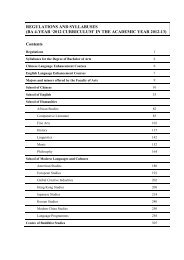Bachelor of Arts (BA) - The University of Hong Kong
Bachelor of Arts (BA) - The University of Hong Kong
Bachelor of Arts (BA) - The University of Hong Kong
Create successful ePaper yourself
Turn your PDF publications into a flip-book with our unique Google optimized e-Paper software.
135ECON0206.Capital theory (6 credits)General equilibrium theory involving time under certainty conditions. <strong>The</strong> concepts <strong>of</strong> full information,stationary state, and steady state. Assumptions about information costs, transaction costs and completemarkets. Fisher's separation theorem. <strong>The</strong>ory <strong>of</strong> consumption over discrete and continuous time.<strong>The</strong>ory <strong>of</strong> production over discrete and continuous time. Determination <strong>of</strong> general equilibrium overtime. Intertemporal prices and interest rates.Assessment: coursework 40%, examination 60%.ECON0207.Monetary economics (6 credits)This course discusses the role <strong>of</strong> money in the economy, including how money affects inflation, interestrates, output and employment in both the static and dynamic contexts. Related topics are theories <strong>of</strong>money demand and supply, the conduct <strong>of</strong> monetary policy, rules vs. discretion, adaptive and rationalexpectations, time inconsistency, the origin <strong>of</strong> money, electronic means <strong>of</strong> payments, currency boardsand the monetary system <strong>of</strong> <strong>Hong</strong> <strong>Kong</strong>.Assessment: coursework 40%, examination 60%.ECON0208.Economics <strong>of</strong> banking (6 credits)This course examines the functions and behaviour <strong>of</strong> banks from an economic rather than amanagement perspective. Topics include the origin <strong>of</strong> financial intermediaries, banks vs. non-bankfinancial institutions, organization <strong>of</strong> the banking industry, lender-borrower relationship, equilibriumcredit rationing, banks as delegated monitors, banks in the macroeconomy, bank runs and systemic risks,risk management <strong>of</strong> the banking firm, and the regulation <strong>of</strong> banks.Assessment: coursework 40%, examination 60%.ECON0209.Finance and development (6 credits)This course studies the interaction between the financial sector and the rest <strong>of</strong> the economy, that is, howfinancial markets and institutions affect economic performance and vice versa. Topics includeflow-<strong>of</strong>-funds accounts, financial structure and economic development, financial repression, financialliberalization and financial deepening, financial reform in developing and transition economies,banking crises and currency crises, capital account liberalization, the globalization <strong>of</strong> world capitalmarkets, and financial policies and regulation.Assessment: coursework 40%, examination 60%.ECON0301.<strong>The</strong>ory <strong>of</strong> international trade (6 credits)<strong>The</strong> theory <strong>of</strong> international trade; the bases, direction, terms, volume, and gains <strong>of</strong> trade. <strong>The</strong> effects <strong>of</strong>tariffs, quantitative restrictions, and international integration.Assessment: coursework 50%, examination 50%.ECON0302.International finance (6 credits)<strong>The</strong> interpretation <strong>of</strong> balance <strong>of</strong> payments and the adjustment to national and international equilibria,through changes in price levels, exchange rates, and national income. Other topics may include: foreignexchange market and Eurocurrency market, alternative exchange rate regimes, capital movements,exchange controls, and international monetary organizations.Assessment: coursework 40%, examination 60%.
















